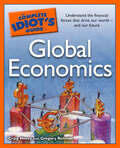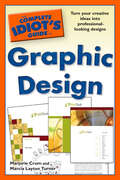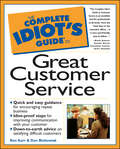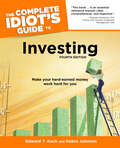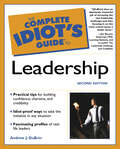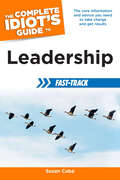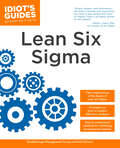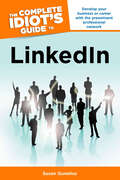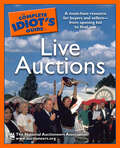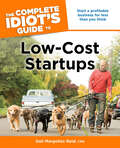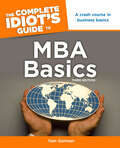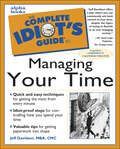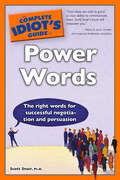- Table View
- List View
The Complete Idiot's Guide to Getting Government Jobs
by The Partnership for Public SvcBail yourself out with employment opportunities In these turbulent times when private corporations are in trouble, the employer that seems to be offering the most stable employment opportunities is the public sector. With The Complete Idiot's Guide® to Getting Government Jobs, readers will learn how to navigate the government application process to find stable employment opportunities available from county municipalities as well as state and federal agencies. • Includes advice on drafting resumes suited to the specific requirements of the hiring agency • How to complete the appropriate application most effectively • Methods of marketing an applicant's skills in the government sector • Search tools for government job websites
The Complete Idiot's Guide to Getting Out of Debt: Simple and Effective Solutions to Get Your Finances on Track
by Ken ClarkBorrowing from Peter to pay Paul? The American economy is dragging, with unemployment rates rising and consumer debt hitting $2.5 trillion. Many people are in deep and need help. Here, a Certified Financial Planner explains the mathematics of debt; strategies to deal with credit card, mortgage, student, and other loans; why debt consolidation and taking loans from a 401(k) can lead to problems; truths about bankruptcy; and how to use debt while eliminating it.• Includes essential resources and websites, sample letters and forms, loan forgiveness programs, bankruptcy resources• Author a Certified Financial Planner• Covers every kind of debt, mortgages to credit cards to student loans• National credit card debt is growing exponentially
The Complete Idiot's Guide to Global Economics: Understand the Financial Forces That Drive Our World—and Our Future
by Craig Hovey Gregory RehmkeThink outside the borders. Global economics affects every aspect of our lives. Free trade agreements, tariffs, terrorism, trade deficits, international debt, global warming, OPEC, outsourcing, and sweat shops are just some of the forces driving our world, food supply, jobs, and future. The Complete Idiot's Guide® to Global Economics provides the key to understanding the various facts, figures, policies, and practices that offer insight into this dynamic subject.
The Complete Idiot's Guide to Grant Writing, 3rd Edition
by Waddy ThompsonAn updated and revised edition-offering new information on some of the most popular topics in grant writing. This new edition of The Complete Idiot's Guide(r) to Grant Writing provides essential information on how to start a freelance business, covering such topics as getting that first assignment, pricing, state regulations, organizing and customizing proposals, researching funders, sponsorship, and much more. In the current economic environment, government and private sector grants will continue to be an important way to acquire funds for projects. Includes grant writing samples. This book's templates and other resources will now be easy to find and use on idiotsguides.com.
The Complete Idiot's Guide to Graphic Design: Turn Your Creative Ideas into Professional-Looking Design
by Marcia Layton Turner Marjorie CrumIf you can dream it, you can design it Whether your goal is to design your own marketing materials, launch a visually compelling blog, or just have some fun creating your own CD covers, The Complete Idiot&’s Guide® to Graphic Design is your one-stop reference. Presented in an intuitive, accessible format, here are the fundamental elements of design and design principles, as well as instruction on how to apply those elements and principles to a variety of projects. • Covers art supplies, software, concept development, reproduction needs, and much more • Sample projects include business cards, print and web ads, and graphic T-shirts • Follows the success of other titles aimed at the aspiring artist, including the Complete Idiot&’s Guide® titles on digital photography, drawing, and manga
The Complete Idiot's Guide to Great Customer Service
by Ron KarrYou're no idiot, of course. You skillfully manage your kids' temper tantrums, diplomatically handle office politics, and even pleasantly deal with your friends' bickering. But when it comes to handling customer service, you feel utterly lost. It's time to make great customer service an indispensable part of your daily operation! The Complete Idiot's Guide® to Great Customer Service teaches you how to create the "Service Difference"—service that genuinely pleases your customers and sets your organization apart from the pack.
The Complete Idiot's Guide to Investing, 4th Edition: Make Your Hard-Earned Money Work Hard for You
by Debra Johnson Edward T. KochA penny saved may be a penny earned, but a penny invested can be even more. In this financial crisis, old advice about equities, mutual funds, commodities, and real estate may no longer hold. Here is a fresh look at all aspects of investing to help readers protect and grow their wealth. This edition includes the most current information on: • Corporate fundamentals• The sub-prime crisis and its effects• Practical tools for evaluating mutual funds• Advice about riding the equity market• The use of Exchange Traded Funds
The Complete Idiot's Guide to Leadership
by Andrew J. DubrinYou're no idiot, of course. You handle your work assignments, monitor the progress of your workgroup, and meet your goals. But when it comes to inspiring others and creating change in your organization, you're confused about what to do next. Want some help? The Complete Idiot's Guide® to Leadership shows you how to start thinking and acting like a leader who can help people perform well and meet organizational goals for increased productivity, quality, and customer satisfaction.
The Complete Idiot's Guide to Leadership Fast-Track: The Core Information and Advice You Need to Take Charge and Get Results
by Susan CabaWritten to quickly develop the reader&’s leadership skills, The Complete Idiot&’s Guide® to Leadership, Fast-Track is a short, but rich introduction to leadership skills and how best to use them. After a brief examination of the required, but learnable, qualities, skills, and behaviors of leadership, the book takes the reader through a self-assessment. Then the tasks, strategies, and desired results of leadership are dissected—all in 160 pages! The Complete Idiot&’s Guide® to Leadership Fast-Track is perfect for new managers, small business owners, organization leaders, and more!
The Complete Idiot's Guide to Lean Six Sigma: Get the Tools You Need to Build a Lean, Mean Business Machine
by Neil DeCarlo Breakthrough Management GroupThe perfect prescription for any organization. Increasingly popular with large and mid-sized companies around the world, Lean Six Sigma is the new hybridization of Six Sigma and Lean methodologies, and there is no better approach for achieving operational excellence in an organization. But how do you implement Lean Six Sigma, and what does it entail? The Complete Idiot&’s Guide® to Lean Six Sigma answers this question with unprecedented clarity and turnkey elegance. Part one gives you all the background you need to understand Lean Six Sigma–what it is, where it came from, what it has done for so many organizations, and what it can do for you and your company. Parts two and three of the book give you a prescribed yet flexible roadmap to follow in selecting, enacting and realizing improvements from Lean Six Sigma projects. Within this step-by-step structure, the authors demonstrate when and how to use the many Lean Six Sigma statistics and &“tools&”–packing the pages with diagrams, real-life examples, templates, tips, and advice. If you are a Green Belt or a Black Belt, or a trainee, these two parts will be invaluable to you. The Complete Idiot&’s Guide® to Lean Six Sigma is the smartest choice if you need a comprehensive primer, and especially if you need to actually improve a process or spread Lean Six Sigma capability throughout your company. It is the best comprehensive reference available to get you on your way to becoming a lean, mean business machine!
The Complete Idiot's Guide to LinkedIn: Develop Your Business or Career with the Preeminent Professional Network
by Susan GuneliusDevelop your business or career with the pre-eminent professional network Most people who are new to LinkedIn don't intuitively recognize the potential of the site when it comes to promoting a business, finding a job/project (or being found for one), or raising money for a business venture. The Complete Idiot's Guide® to LinkedIn goes beyond the usual "how to set up and account" and "create a profile" to help readers become LinkedIn super-users and get the most out of the website based on their individual goals. The book provides new users with clear and detailed guidance on: • Filling out the various parts of the LinkedIn profile, customizing it to meet specific professional goals • The right and wrongs ways of doing things on LinkedIn-especially helpful to those used to Facebook• Finding the right people, making the right introductions, and growing and managing networks • Finding and communicating with LinkedIn Groups to help achieve individual business goals • Specific suggestions for using LinkedIn to find a job, market a business, raise capital, and increase sales
The Complete Idiot's Guide to Live Auctions: A Must-Have Resource for Buyers and Sellers—from Opening Bid to Final Sale
by The National Auctioneers AssocDo I hear $16.95? A $227.5 billion enterprise around the world, live auctions feature everything from cars to homes, fine art to coal. The only book of its kind, this guide will show how lucrative, fast-paced, and exciting this business is. It covers rules, lingo, setting up an auction, hiring professional auctioneers, and how the most popular auctions work. • 24% of U.S. consumers, or around 50 million people, spend an average of four hours at live auctions each year • Expert author: the National Association for Auctioneers • Detailed run-down of every aspect of live auctions • Resource section with auction house listings
The Complete Idiot's Guide to Long-Term Care Planning
by Marilee DriscollThe basic motivators will drive people to want to learn more about this topic—fear, money, and insecurity. Consumers fear losing their life savings to LTC costs. Yet, they hesitate to buy insurance with an annual premium of $1,800 without knowing what it covers.In October of 2002 (one month after this book's release), the federal government will be rolling out a payroll deduction plan whereby all government employees and retirees (approximately 18 million people) will have the same opportunity to save for their long-term care needs as they currently have for their 401(k).
The Complete Idiot's Guide to Low-Cost Startups: Start a Profitable Business for Less Than You Think
by Gail ReidEvery dream has to start somewhere! With the shaky economy and unemployment rising, more and more people are trying to find alternative ways to start businesses out of their homes. But what is the right home grown business? What skills are necessary? What will it really cost and how much money will it generate? All these questions and more are answered in The Complete Idiot's Guide® to Low-Cost Startups. • Expert author with over 30 years experience in the area • Ways to determine which business is right for you-and the most effective to start • Great, innovative ideas from hi-tech service to low-tech selling • Practical nuts and bolts advice on starting and running the business • Solid information about costs, financing, taxes, and organization
The Complete Idiot's Guide to MBA Basics, 3rd Edition: A Crash Course in Business Basics
by Tom GormanThis is the time to expand your career opportunities-and the knowledge in here can be the key. This third edition compresses the most significant skills and lessons of a two year MBA into one comprehensive guide. With clear, concise information, expert Tom Gorman includes recent developments in management, economics, marketing, leadership, information technology, and communications. Whether the reader is studying to achieve an advanced degree or needs the concrete, practical skills required in the business world, this guide is the most current and comprehensive available. Practical guide to the most significant issues facing business professionals today. A suitable study tool for all graduate students as well as those trying to expand their skills and knowledge in their careers.
The Complete Idiot's Guide to Managing Your Time
by Jeff DavidsonWith this guide, readers will discover the basics of how to manage time and prioritize, with solid advice on how to say "no" when a responsibility just can't be handled.The Complete Idiot's Guide® to Managing Your Time includes:• Quick and easy techniques for getting the most from every minute• Idiot-proof steps for controlling how you spend your time• Valuable tips for getting paperwork into shape
The Complete Idiot's Guide to Marketing, 2nd edition: Priceless Pointers on the Classic “Four P’s”—Product, Place, Price, and Promotio
by Sarah WhiteFrom online marketing to old-fashioned word-of-mouth, readers will find a comprehensive update on key marketing basics, as well as such topics as: • Guerilla marketing. • Marketing to Boomers and Latinos. • Online marketing. • Targeted, but affordable direct mail. • Sample marketing plans for several types of small businesses (as well as a couple of larger projects). • Practical, do-it-yourself distribution strategies. • Analysis of business segments and trends, and much more.
The Complete Idiot's Guide to Meeting & Event Planning, 2E
by Lynn Johnson Golabowski Robin E. CravenYou&’re no idiot, of course. You know you can&’t throw a corporate function together overnight—especially if you want to impress clients, shareholders, and upper management. Whether you&’re prepared to tackle the task yourself or you&’re considering hiring a professional, you want your event to be a stellar occasion to remember. The Complete Idiot&’s Guide® to Meeting and Event Planning, Second Edition, will show you how to organize any company gathering on time and on budget, whether you&’re hosting 10 or 10,000. In this revised and updated Complete Idiot&’s Guide®, you get: • Up-to-date information on planning and budgeting software, phone and data lines, audio and video, and satellite bookings. • Expanded coverage on international conferences—via remote, abroad, or by international components. • Ideas for smoothly dealing with last-minute glitches and crises.
The Complete Idiot's Guide to Money for Teens: Straight Talk on Making, Saving, and Spending Your Own Money
by Susan ShelleyYou&’re no idiot, of course. Money&’s always on your mind; if you&’re not working to make more, you&’re wondering where it all went. Will you have to give up movies and CDs to get your bank account to grow? Play it smart and you can have it all! Whether you&’re saving for something big like college or wondering why you're always broke, this info-packed book has the answers you need. The Complete Idiot&’s Guide® to Money for Teens can show you how to: • Stop the bleeding! Easy ways to get a grip on your expenses. • Make sense of bank and credit card statements. • Work wise and shop smart; get the most of your money. • Pay less for the things you buy—even designer labels! • Learn what it takes to be a teen entrepreneur.
The Complete Idiot's Guide to Paying for College: Find the Money You Need for the College You Want
by Ken ClarkA higher education without falling deep in debt. With the lack of financial aid, grants, and scholarships available today due to the economic climate, parents and students need serious help in finding ways to pay for college. Savings plans and resources have disappeared. Loans seem impossible to pay off. That's where The Complete Idiot's Guide® to Paying for College steps in. It helps develop an action plan for people to budget and pay for college right now, and if necessary, strategize repayment after graduation. It also explains how to: • Find ways to lower the cost of tuition and room and board • Find honest–to–goodness free money • Discover more affordable options like college credit for military service, peer–to–peer lending, or attending nontraditional colleges and universities
The Complete Idiot's Guide to Person-to-Person Lending
by Beverly Harzog Curtis E. ArnoldForget credit card companies—make it personal! The Complete Idiot's Guide® to Person–to–Person Lending fills readers in on what they need to know, such as how person–to–person lending works, who lends and who borrows, and the advantages and disadvantages of Virgin Money, Prosper, Zopa, and Facebook's Lending Club.• Loans on Prosper and LendingClub rose to $100 million in 2007; by 2010, the online banking report forecasts $1 billion in person–to–person loan originations• Javelin Strategy & Research (Dec. 2007) predicts that the demand for person–to–person lending services may grow from $38 billion to $159 billion over the next five years.
The Complete Idiot's Guide to Personal Finance in Your 40's & 50's
by Susan Shelly Sarah FisherDeveloping and maintaining personal finance doesn&’t end by middle age! With The Complete Idiot&’s Guide® to Personal Finance in Your 40s & 50s learn: • Quick and easy ways to learn with the information exists• Idiot-proof steps to understanding how the information affects you• Comprehensive coverage of the consequences of the information
The Complete Idiot's Guide to Pinterest Marketing: Tap into Key Markets Using the Hottest Social Media Image-Sharing Site
by Barbara Boyd Christine MartinezPinterest is a social media site that enables users to create online pinboards of compelling images they find online by "pinning" the images and curating them into various categories. It has exploded into American consciousness with big media attention and exponential growth-most notably reaching 10 million unique monthly visitors more quickly than any social media site in history. The vast majority of early devotees have been women of higher income between the ages of 25 and 49, and the images they pin frequently fall into the categories of clothing, crafts, food, and home décor. This represents a significant opportunity for companies and brands whose products are targeted to this market; however, Pinterest has value far beyond its initial popular use. Companies large and small are hearing the hype and hoping to get an early start with a site that shows signs of continued growth and influence. The Complete Idiot's Guide® to Pinterest Marketing helps small business owners as well as marketing experts at larger companies get on the Pinterest bandwagon and learn how to use this exciting new phenomenon to increase online exposure for their products, strengthen their online presence, and connect with customers in a place where they are now flocking. In it, readers learn how to: Use the basic features of Pinterest, including setting up an account, creating boards, and pinning images. Develop a Pinterest marketing strategy and integrate it with other online and offline presences. Project a brand voice onto Pinterest through strategic pinning and writing compelling pin copy. Create pins that get repinned. Grow a following organically and understand the importance of whom a brand follows. Engage an audience through contests, collaborative boards, and more. Determine who in the organization will pin, or whether to outsource it. Gauge and quantify the success of a brand's marketing efforts on Pinterest.
The Complete Idiot's Guide to Power Words: The Right Words for Successful Negotiation and Persuasion
by Scott SnairAt a loss for words The gift of understanding power words and phrases will allow readers to set themselves apart, be more assertive, and impress and inspire others. The Complete Idiot's Guide® to Power Words also discusses how to develop and encourage clear-headed attention between parties, proactive listening techniques, genuine interest, and open-mindedness. Engaging in the craft of utilizing power words and phrases makes readers more important-and more influential.• Word power books continue to be popular• Provides practical, step–by–step advice for learning the words and phrases that will make all the difference when arguing a point
The Complete Idiot's Guide to Private Investigating, Third Edition: Discover How the Pros Uncover the Facts and Get to the Truth
by Steven Kerry BrownThe mystique of private investigating draws significant numbers of people to consider it as a career or side business. At the same time, individuals want to learn investigative techniques to solve their own personal and legal problems. In The Complete Idiot's Guide® to Private Investigating, Third Edition, private investigator and former FBI agent Steven Kerry Brown shares his hard-won expertise on everything you need to know to track down people and information, including: Tapping phones and recording conversations. Interviewing and interrogating to get important information. Tricky but legal ways to get needed evidence like the pros. Performing onsite, online, and mobile surveillance without being detected. Skip tracing to find lost loves or people who owe money. Investigating backgrounds of potential employees or spouses. Searching public records online and at the courthouse. Catching a cheating spouse and gathering evidence for divorce cases. Finding runaway teenagers. Doing diligent searches connected with adoptions and estates. Tracking down burglars, thieves, pickpockets, and purse snatchers. Advanced techniques and business advice for those interested in starting their own investigative or background screening agency. Along the way, Brown shares fascinating stories from his cases that highlight his clever methods for tracking down evidence and helping his clients find out what they need to know.


